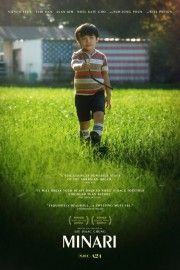Minari
There were a number of films that crossed my mind in watching “Minari.” The two that were most vivid were “Nobody Knows,” by Hirokazu Kore-eda, and Ken Loach’s “Sorry We Missed You.” Both films are about people who do extraordinary ordinary things for their family, and Lee Issac Chung’s film fits in with that idea. Inspired by Chung’s childhood, “Minari” is as traditional a human story as you can ask for, with its strength coming from the way it lands its final punches. It’s more hopeful than those films I mentioned earlier, but it also toes the line of tragedy in a way that gets you nonetheless.
As traditional a human story as “Minari” is, it’s also a traditional American story about trying to capture the “American Dream” (or, at least, what we’ve internalized that as meaning), and the struggles that come with that. Chung is telling the story of a Korean family that is moving from California to Arkansas to start a new life. Well, the father, Jacob (Steven Yeun), is, and he’s essentially dragging his family along with him. He and his wife, Monica (Yeri Han), are chicken sexers, which is to say that they separate baby chicks between male and female. They continue that work in California, but they have come to Arkansas, and a remote 50 acres of land in Arkansas, so that Jacob can have a farm, which he will grow fruit and vegetables in to be sold to Korean grocers. They also have their two children- David (Alan S. Kim) and Anne (Noel Cho) with them, and they will also get Monica’s mother, Soonja (Yuh-jung Youn), here as well. As they begin their life, though, Jacob finds that farming is not as easy as he would hope, especially the business of it, and keeping his family happy is even harder. Can you really find the American Dream for yourself if it creates tension for others you love?
“Minari” and the two films I mentioned earlier have in common the idea of personal sacrifice for the greater, hopeful success of the family as a whole. Jacob is taking a giant swing with this choice, and it is one that falls entirely on him to succeed; that personal stress is palpable, but seeing how the family reacts is one of the reason’s “Minari” is so successful. The moment that Monica sees their home- which is a trailer home, wheels and everything- you know that this is more a personal choice for Jacob that a shared sacrifice Monica is on board with. It comes with so much risk- not just financial but health risks (David has heart issues, and the nearest hospital is an hour away, and Soonja is older and will have a stroke as the film progresses)- that when you see potential danger on the horizon for this family, and are unable to stop it, it makes those moments feel as helpless for us as it is the characters.
This is a beautifully-observed character drama, and there are strong performances all around. I have yet to see Chung and Yeun’s previous collaboration, “Burning,” but seeing the quiet stress that Jacob walks through the film carrying on Yeun’s face every step of the way in this film makes it a priority for me in the immediate future. Han carries the anxieties of a mother worried about not just being a normal mother, and caregiver for her mother, but of a wife who worries that her husband is thinking just about himself, and that David might drop dead at any moment. The dynamics when Soonja, played wonderfully by Youn, enter the picture are fascinating. We’re not quite sure what to make of her behavior towards her grandkids, and it’s something David in particular picks up on; you don’t have too many moments in films where a grandmother character has to actually tell a grandchild that she promises to act more like a grandchild, and it makes for some interesting, and entertaining, moments in the film. Will Patton has a role as Paul, a local evangelist farmhand whom Jacob hires to help him tend to the farm; the way Southern evangelism is brought into the film, and the family’s lives, is compelling, and Patton’s role is not just that of an eccentric local, but a good person who sees this family as needing help, and wants to do as Jesus told us to. The standout performance, though, is Kim as David. More than Jacob, this film is seen through David’s eyes and experiences, and though that makes sense, as he is the stand-in for Chung, it makes the film much more compelling to watch, and laudable in the way that Chung manages to tell the larger story of his family, while also giving us a glimpse of his perspective, as well. David is the heart of the movie, and Kim’s performance is one of the great child performances in recent memory.
Where does the title come from? Minari is a plant from Korea that, as Soonja tells it, is a catch all herb that can be used for any purpose. She has brought some seeds with her, and decides to plant some by a nearby creek. By the end, that decision will help rescue this family from more than one strife that befalls them in the film. Minari is what gives them a chance to survive, and for a family struggling, sometimes the best thing you can do is realize it’s best to survive together rather than apart.










